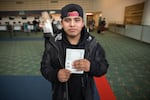Spanish version (Versión en español): Joven Guatemalteco Se Autodeporta De Oregon Por Temor A Incursiones De ICE
Ignacio García-Pablo, 21, came to America five years ago. It took him about a month to travel the more than 3,000 miles from Guatemala to Oregon, he says.
He rode a dangerous cargo train known to locals as La Bestia, or the Beast. Then he traveled by car and hired a coyote to smuggle him across the U.S.-Mexico border.
But he says it was worth it: there’s opportunity in the U.S. — something he doesn’t have at home, where drought, crime and political corruption have made prospering nearly impossible.

“I paid my plane ticket to leave voluntarily, but I am thinking to come back in four years, after Donald Trump leaves office,” said Ignacio García-Pablo, 21, of Guatemala.
Kim Freda / OPB
“In Guatemala it's very difficult to build a home," he told OPB in an interview conducted in Spanish. "(In the United States) I came to work and earned money to build a home for my parents and my future family. That’s why I came here."
Oregon’s immigrant community — and the industries it helps power — have been hit hard by President Trump’s focus on increasing immigration enforcement. In some predominately Latino communities, fears about deportations have prompted life as usual to shut down.
And in a few cases, immigrants are going as far as deporting themselves.
In the United States, García-Pablo found work with Great Produce Evergreen, a nursery in Newport.
Owner Fermin Miranda says his employees work on U.S. Forest Service land stretching from Tillamook to the California border, picking blueberries and salal, an evergreen shrub.
García-Pablo works hard. His hands feel like sandpaper, and they’re covered in warts from working in dirt. For his efforts, he makes about $100 a day. He has sent his parents enough money to build a home in Guatemala.
He comes from a big family. He and two of his brothers have lived in the United States and worked at Great Produce Evergreen at different times over about 10 years.
“That’s the way it works with them,” Miranda said in a conversation conducted in Spanish. “They leave, they go to see their families and over time they reappear here.”

Ignacio Garcia-Pablo's identification card from the Northwest Detention Center in Tacoma, Washington, along with his flight itinerary to return to Guatemala.
Kim Freda / OPB
García-Pablo thought he’d stay in the United States for a few more years.
He hadn’t worried about being deported or being in the country illegally. He says his immigration status didn’t impact his daily life.
That changed with the 2016 presidential election.
“I was thinking to stay seven to eight years, but when I came to the U.S., Obama was the president, and everything was a little calmer,” he said. “Now that Donald Trump was elected, he always said on the news that he was going to deport all the people who are undocumented here. So I thought, ‘I don’t want to get deported. I don’t want to be detained. I don’t want to be in prison.’ That’s why I bought my plane ticket to go home.”
His older brother had already gone back to Guatemala in January, not long after Trump's inauguration. García-Pablo bought his ticket for early April. A week before his flight, ICE agents showed up at his door in Newport.
Related: ICE Temporarily Stops Publishing Report Naming Uncooperative Sheriffs
They told him they were looking for someone who, it turned out, didn’t live at his house, which he shared with his brothers, cousin and their families.
“They asked me ‘What is your name?’ I gave them my complete name and the day of my birthday, and they asked me if I have a legal paper from here,” he said. “I said, ‘To tell you the truth, I don’t have it.’”
The agents asked him how long he’d been in the United States. He answered honestly: Five years.
He also handed over his passport and his card from the Guatemalan consulate.
“They checked my name on those papers, and then they said ‘You know, we are ICE,’ and I got sad,” he said. They told him they were taking him to ICE’s Portland office.
“I asked them, ‘Why are you taking me if I don’t have a record?’” he said. “They said, ‘We are looking for someone who committed a crime. But that person lives in another house now. You have bad luck.’”
Agents arrested García-Pablo, his brother and his cousin and took them to the Northwest Detention Center in Tacoma, Washington. García-Pablo kept telling agents he was already planning to go home — he even had a plane ticket to prove it.

Ignacio Garcia-Pablo, 21, takes a selfie with Marta Guembes, Honorary Consul of the Guatemalan Consulate of Oregon.
Kim Freda / OPB
Eventually, the Guatemalan Consulate got involved. Consulate official Marta Guembes convinced ICE officials to release García-Pablo into her custody until his flight out of the country.
García-Pablo left the United States on April 2.
Before the trip, he said he felt good about going home on his own terms. But he was also looking ahead.
“I paid my plane ticket to leave voluntarily," he said. "But I am thinking to come back in four years, after Donald Trump leaves office."